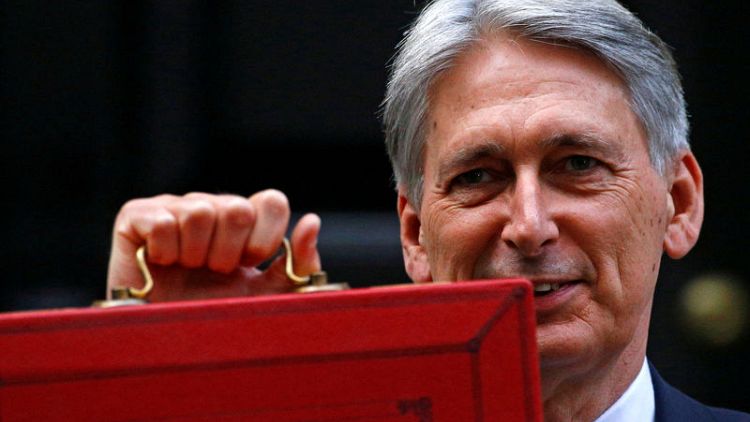By David Milliken and Alistair Smout
LONDON (Reuters) - Chancellor Philip Hammond raised the prospect of looser budget policy after Brexit and said faster growth was the best way to cut Britain's debt burden, but insisted he was still committed to ultimately running a budget surplus.
Hammond's annual budget last week reinforced some analysts' doubts about his commitment to a budget surplus, after he used a tax windfall to fund public spending commitments rather than to make faster progress at reducing public debt.
Prime Minister Theresa May said last month that austerity was ending after a series of cuts to public services and welfare benefits since 2010, and had previously announced a big rise in public healthcare spending.
The non-partisan Institute for Fiscal Studies said Hammond's actions suggested that the idea he really intended to eliminate the budget deficit by the mid-2020s was "surely for the birds".
Asked by a parliamentary committee if the Treasury had given up on the prospect of running a budget surplus in the next decade, Hammond said: "No, it hasn't been abandoned."
However, he declined to say when he expected a surplus. Budget forecasts last week showed government borrowing as a share of national income on track to fall to 0.8 percent in 2023/24 from a lower-than-expected 1.2 percent -- or 25.5 billion pounds -- this financial year.
"We are within touching distance (of a surplus), but it will be a policy decision at successive fiscal events how to balance whatever available fiscal headroom there is between reducing the deficit, reducing taxes, increasing spending ... and investing in capital infrastructure," he told legislators.
Government borrowing is already forecast to rise to 1.4 percent of gross domestic product (GDP) next year, and Hammond said he could borrow more after Britain leaves the European Union on March 29 next year and still meet budget rules.
"We could, if we chose to, allow borrowing to rise a little," Hammond said.
Hammond said finding a way to boost sluggish growth was likely to be a more viable strategy to rapidly reduce debt as a share of GDP than persistently running budget surpluses, which Britain has rarely managed in previous decades.
"There's a very hard way of doing it, which is running a budget surplus every year and paying off the cash debt," he said. "And there's a much easier way of doing it, which is (to) get the economy growing faster."
Total public sector net debt is forecast to fall to 83.7 percent of GDP this year, or 1.835 trillion pounds.
(Additional reporting by Elizabeth Piper, editing by Ed Osmond)



